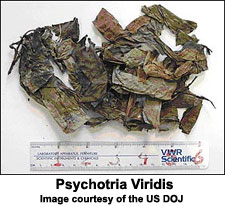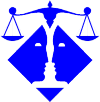November 9, 2005
Updated: March 7, 2006
 In early November 2005, justices of the US Supreme Court heard arguments
for and against the importation of hoasca tea. Hoasca contains
dimethyltryptamine (DMT), an illegal, hallucinogenic drug. The tea is
used by members of the Brazil-based church called O Centro Espirita
Beneficiente Uniao do Vegetal (UDV) during religious ceremonies. There
are only 130 members of the church in the United States.
In early November 2005, justices of the US Supreme Court heard arguments
for and against the importation of hoasca tea. Hoasca contains
dimethyltryptamine (DMT), an illegal, hallucinogenic drug. The tea is
used by members of the Brazil-based church called O Centro Espirita
Beneficiente Uniao do Vegetal (UDV) during religious ceremonies. There
are only 130 members of the church in the United States.
Hoasca tea is made by brewing two Amazonian plants called Psychotria
viridis and Banisteriopsis caapi. The plants are considered to
be sacred to the UDV and the tea is used for religious purposes only. In
May 1999, US Custom agents seized three drums of hoasca tea sent from
Brazil to the UDV in the US. After lower courts debated the legality of
the seizure, the US Supreme Court heard arguments about whether the
Religious Freedom Restoration Act of 1993 should permit the importation,
distribution, possession, and use of hoasca by the UDV.

Government's Case AGAINST Hoasca
- DMT is an unsafe drug and has a high potential for abuse. The drug
has actions similar to LSD and can cause
psychosis, hallucinations and heart problems.
- The importation of DMT-containing tea will harm efforts to halt drug
abuse. The government must protect the public from harm caused by drugs.
- Hoasca may be used for non-religious purposes.
- Because hoasca contains DMT (a Schedule I drug), it is illegal and
its importation violates international law.
UDV Response to Government's Case
- Although hoasca contains DMT, exceptions of Schedule I drugs for
religious use have been made in the past. For example, congress changed
federal law to allow Native American tribes to use peyote in religious
ceremonies.
- The amount of DMT in hoasca does not cause UDV members to
hallucinate.
- Hoasca rarely causes health problems to UDV members. A seven-year
study of UDV members in Brazil showed that of approximately
325,000 uses of hoasca, there were only nine minor health problems
reported.
- There are no documented cases where hoasca has been used for
non-religious purposes in the US.
- The importation of hoasca does not violate some international laws
(e.g., the 1971 United Nations Convention on Psychotropic
Substances) because hoasca is not mentioned specifically.
|
Dimethyltryptamine (DMT)
- DMT is an illegal drug that can cause hallucinations.
- DMT can be smoked,
snorted, injected or brewed and consumed as a tea.
- DMT is a Schedule
I drug: it is illegal to buy, sell or possess DMT without a license in
the United States (and in many other countries).
- DMT is found
naturally in many different plants.
- DMT acts quickly and has short-lasting effects.
|

![[email]](./gif/menue.gif)



 In early November 2005, justices of the US Supreme Court heard arguments
for and against the importation of hoasca tea. Hoasca contains
dimethyltryptamine (DMT), an illegal, hallucinogenic drug. The tea is
used by members of the Brazil-based church called O Centro Espirita
Beneficiente Uniao do Vegetal (UDV) during religious ceremonies. There
are only 130 members of the church in the United States.
In early November 2005, justices of the US Supreme Court heard arguments
for and against the importation of hoasca tea. Hoasca contains
dimethyltryptamine (DMT), an illegal, hallucinogenic drug. The tea is
used by members of the Brazil-based church called O Centro Espirita
Beneficiente Uniao do Vegetal (UDV) during religious ceremonies. There
are only 130 members of the church in the United States.